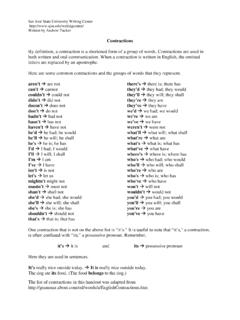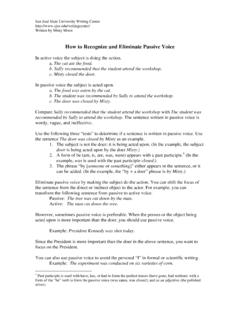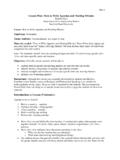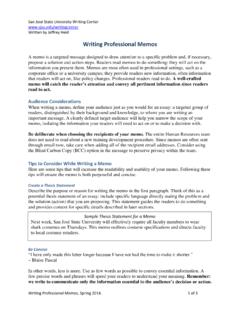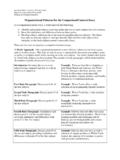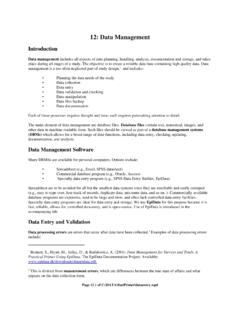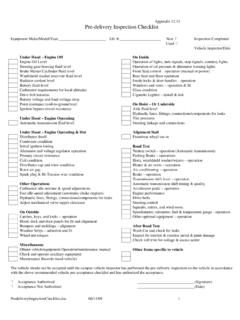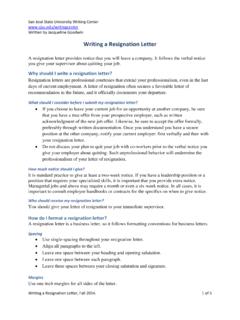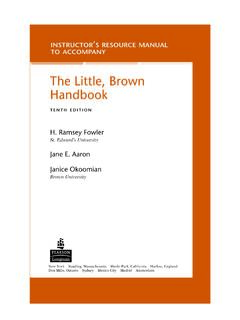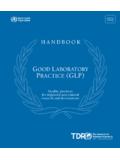Transcription of Infinitives - San Jose State University
1 San Jos State University Writing Center Written by Evin de Leon Sanchez Infinitives An infinitive is a verbal, a verb form or construction that plays the role of a different part of speech in a sentence.
2 Although Infinitives contain verbs, they cannot function as verbs. They do not convey a sense of tense on their own, and sentences containing them must include at least one finite main verb. Forming the infinitive Infinitives are formed by placing to in front of the base form of a verb. They are negated by placing not in front of them. to write not to write to read not to read to sleep not to sleep Functions The infinitive has many functions. It can be helpful to identify what role an infinitive plays in a sentence: with the proper understanding of how an infinitive is used, writers can structure their sentences with clarity and precision.
3 As a Noun An infinitive can act as a noun, appearing as the subject or direct object of a sentence. It can also appear as a subject complement, which provides information about the subject, following a linking verb (such as is) in the predicate of a sentence. One way to test whether or not an infinitive is acting as a noun is by replacing the infinitive with the word something. Subject: To dream requires incredible courage. [Something requires courage.] Direct object: He wanted to cry. [He wanted something.] Subject complement: Our aim is to improve.
4 [Our aim is something.] As an Adjective Infinitives can also be placed after any noun in a sentence, acting as an adjective. Describing a Subject: The best person to consult is your counselor [whom you should consult]. Describing an Object: The teacher assigned several exercises to complete [exercises that must be completed]. Infinitives , Spring 2018. 1 of 6 As an Adverb Infinitives can also be adverbial, modifying any verb in a sentence.
5 These Infinitives tell the reader why the action is necessary. Note that the infinitive can either precede or follow the main clause of a sentence: it is movable. Before Main Clause: To do well in college, one must study diligently. After Main Clause: We tell stories to teach lessons. infinitive Phrases Infinitives can be combined with other words and phrases to provide additional information about the action expressed in the infinitive . San Jos State University teaches students to think critically. Here, the adverb critically describes how SJSU teaches its students to think.
6 In the example above, students is the actor of the infinitive phrase: they are taught (by SJSU) to do something (to think critically). Without an actor, the main subject of the sentence is also the implied actor of the infinitive phrase. The scientists promised to build jetpacks before the end of the century. This can be thought of as a shorthand relative clause: The scientists promised that they would build jetpacks before the end of the century. Bare Infinitives When used with certain verbs, the word to is dropped from an infinitive . With Modal Verbs Bare Infinitives are always used with the modal verbs can, could, may, might, must, shall, should, will, and would.
7 These verbs combine with Infinitives to express the conditional mood, which conveys a sense of necessity or possibility. The combination of a modal verb and a bare infinitive can take the place of the main verb of a sentence. We must (to) search for alternative energy sources. There might (to) be a better course of action. Special Cases The verbs bid, let, watch, see, make, help, and hear take bare Infinitives . The constructs had better and had rather (an archaic form of would rather, an expression of preference commonly used in British English) also take bare Infinitives .
8 Infinitives , Spring 2018. 2 of 6 This will help (to) wash out the stain. The whole family heard her (to) sing the National Anthem. You had better (to) speak your mind before it s too late. I had rather you not (to) disturb me while I work.
9 Lastly, the verbs dare and need can take bare Infinitives under certain circumstances. Interrogative: How dare you (to) defy my orders? Need I (to) ask why you disobey me? Negative: I dare not (to) invade your privacy. You need not (to) worry. Dare say : I dare (to) say [I suppose] our future looks bright. Split Infinitives When a word or phrase appears between to and the verb in an infinitive , it is called a split infinitive . They are considered by some grammarians to be improper and should be avoided in formal writing. Revise split Infinitives whenever they make the sentence difficult to understand.
10 At the apex of its ascent, the falcon stopped to swiftly and suddenly dive at its prey. Revision: At the apex of its ascent, the falcon stopped to dive swiftly and suddenly at its prey. A split infinitive containing a single adverb is acceptable in informal contexts, especially when moving the adverb makes the sentence awkward or unclear. To properly prepare for my presentation, I must research both sides of the debate. To prepare properly for my removes the emphasis on properly. To prepare for my presentation, I must properly emphasizes the wrong verb.
